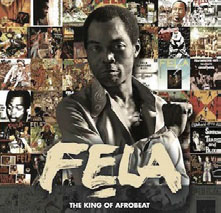Yellow Fever/Na Poi
Author: Nigel Williamson
View album and artist detailsAlbum and Artist Details
Shuffering & Shmiling/No Agreement
Artist/band: |
Fela Kuti |
Magazine Review Date: |
July/2013 |
Upside Down/Fela and Roy Ayers
Artist/band: |
Fela Kuti |
Magazine Review Date: |
July/2013 |
Opposite People/Sorrow Tears & Blood
Artist/band: |
Fela Kuti |
Magazine Review Date: |
July/2013 |
Zombie
Artist/band: |
Fela Kuti |
Magazine Review Date: |
July/2013 |
Coffin for Head of State/Unknown Soldier
Artist/band: |
Fela Kuti |
Magazine Review Date: |
July/2013 |
Stalemate/Fear Not for Man
Artist/band: |
Fela Kuti |
Magazine Review Date: |
July/2013 |
VIP/Authority Stealing
Artist/band: |
Fela Kuti |
Magazine Review Date: |
July/2013 |
Ikoyi Blindness/Kalakuta Show
Artist/band: |
Fela Kuti |
Magazine Review Date: |
July/2013 |
Artist/band: |
Fela Kuti |
Label: |
Knitting Factory Records |
Magazine Review Date: |
July/2013 |
JJD/Unnecessary Begging
Artist/band: |
Fela Kuti |
Magazine Review Date: |
July/2013 |
It’s now 16 years since Fela Kuti died and his legendary status continues to grow. The problem with legends, though, is that their mythical properties can get in the way of an appreciation of the music, and arguably the outlandish exploits of Fela’s storied life are now better known and celebrated than his recorded legacy.
One of the difficulties is that Fela himself never regarded his recordings as a definitive statement of his art and he certainly wasn’t making them for posterity. They were snapshots in time, bulletins from the frontline on the day he happened to be in the studio. And he churned them out with prodigious energy and urgency. The latest batch of ten CDs in the vast reissue programme by Knitting Factory represents the output of just five tumultuous years, from 19 original vinyl LPs released between 1976 and 1980. No surprise, then, that it’s a sprawling and spotty body of work, mixing genius and mundanity and electrifying moments with passages of dullness. More often than not, you’ll have both within the space of the same 15-or 20-minute track, which makes it almost impossible to cherry-pick.
That said, there are an awful lot of highs here in the non-stop, funked-up jam that appears to have been Fela’s life. Try his orgasmic scat singing and dirty talk on the title track of Na Poi (1976). Or the brilliant locked-down groove of ‘Gba Mi Leti Ki N’Dolowo’ (Slap Me Make I Get Money) from Ikoyi Blindness (1976).
Then move onto the mysterious ‘Don’t Make Garan Garan’ from Kalakuta Show (1976) with its eerie electric keyboards, the superbly intricate ensemble playing of Tony Allen and Afrika 70 on the live recording (at The Shrine) of ‘Johnny Just Drop’ on JJD (1977) and the wild Afro¬jazz horn symphony on ‘No Buredi’ from Unnecessary Begging (1976).
The intense soloing of guest American trumpeter Lester Bowie from the Art Ensemble of Chicago turns No Agreement (1977) into an intercontinental jazz-funk tour de force and the vibraphone player Roy Ayers does the same for ‘2000 Blacks Got To Be Free’ on Fela and Roy Ayers (1980). Then there’s the title-track of Zombie (1977), on which an infectious groove, insurrectionary lyrics and potent call-and-response vocals come together on one of the tightest, most focused pieces of music Fela ever recorded. Different again is the elegy for his mother that constitutes the single 23-minute track on the album Coffin for Head of State (1980), the white-hot heat of the boiling Afro-beat groove dramatically turned down to a simmering, haunting dread.
All human life is here – in its thrilling, infuriating, angry, joyous, uplifting, self-indulgent, inspiring magnificence.


